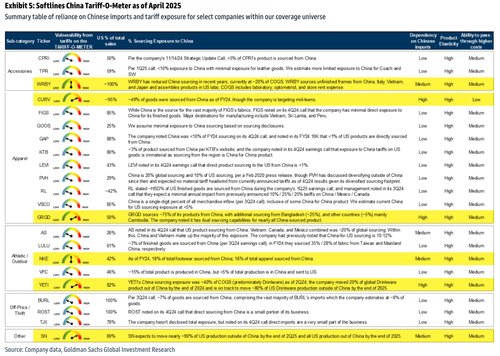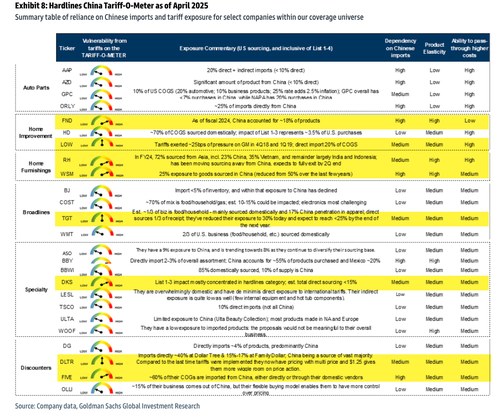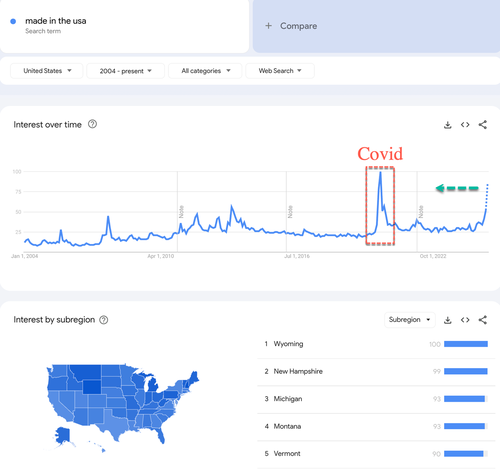Ahead of President Trump's "Liberation Day" tariff rollout on Wednesday afternoon—particularly the 25% tariff on vehicles and auto parts imported into the U.S.—reports surfaced last week of consumers rushing to dealerships to purchase vehicles already on the lot, as those would be exempt from the new levies. We suspect that if consumers are willing to flock to auto dealerships, they're probably just as willing to stock up on their favorite Chinese-made products before the next round of tariffs takes effect this weekend and next Wednesday.
Tariffs on Chinese goods are set to increase by 34% next Wednesday, on top of the existing 20%, bringing the effective rate to 54%. This will significantly impact companies heavily reliant on Chinese manufacturing (and other Asian countries), forcing them to absorb the cost or pass it on to consumers—setting the stage for sticker shock.
Goldman analysts Brooke Roach, Kate McShane, and others earlier today provided clients with a breakdown of Trump's reciprocal tariffs:
On April 2nd, President Trump announced reciprocal tariffs. This includes a 10% tariff increase on all countries (excluding Mexico and Canada) and a higher rate of increase on select countries with trade deficits, set to take effect on April 5th and April 9th, respectively.
We believe the most material impact to our retail coverage from the announcement is the increase in tariffs on key sourcing partners for retail such as Vietnam, Indonesia, Bangladesh, and Cambodia.
China: Tariffs on China move to 54% (a 34% increase vs. the 20% tariff already in effect).
Tariffs broadened to key sourcing partners: Tariffs on other key sourcing partners for U.S. retail are set to be implemented, including Vietnam (46%), Indonesia (32%), Bangladesh (37%), Italy (20%), India (27%), and Cambodia (49%). Imports from the European Union will also be subject to a 20% tariff.
Canada and Mexico: The announcement maintains tariffs on Canada and Mexico. Exemptions under USMCA will remain, which exempt compliant products from the 25% tariff rate on both countries. Should current orders be terminated, USMCA compliant products would receive preferential treatment while non-USMCA compliant goods would be tariffed at a 12% rate.
Material increase to softlines tariff rate overall: On our calculations, the announcement implies a ~38% weighted average tariff rate for total apparel and footwear imports to the U.S.
Given the tariff breakdown and timeline, Roach and McShane provided clients with a "China Tariff-O-Meter," highlighting companies in their retail coverage whose supply chains are heavily exposed to China, Vietnam, Indonesia, Bangladesh, and Cambodia.
From their Softlines coverage, companies such as Warby Parker, Torrid Holdings, Groupe Dynamite, Nike, Yeti Coolers, and SharkNinja have high exposure to China and other Asian countries targeted by Trump's upcoming round of tariffs. In other words, the products from these companies entering U.S. ports in the coming days will be subjected to sizeable tariffs.
In their Hardline coverage, companies such as Floor & Decor, Lowe's, RH, Williams-Sonoma, Target, Dick's Sporting Goods, Dollar Tree, and Five Below have elevated or high supply chain exposure to China or other Asian countries.
Take note of the Softline and Hardline retailers listed above. If there's a product you've been eyeing—whether it's a new couch from RH or some Chinese junk from Five Below—now might be the time to buy.
To avoid paying higher prices for foreign goods, just buy American.
We also suspect searches for "American Made" will begin to rise.
Loading...


